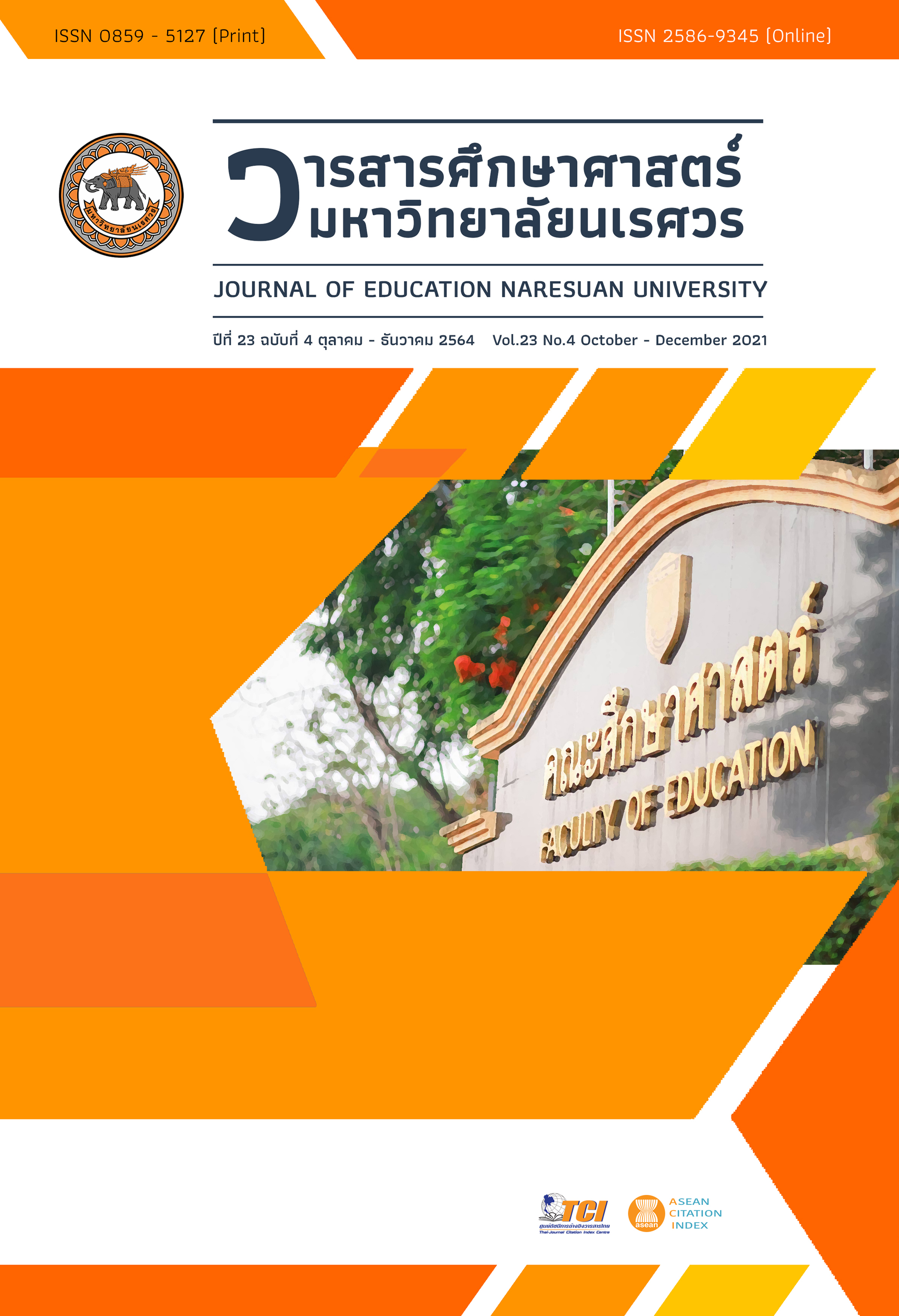TEACHERS’ INSTRUCTIONAL COMPETENCY DEVELOPMENT TO PROMOTE HIGHER ORDER THINKING FOR SECONDARY STUDENTS การพัฒนาสมรรถนะการจัดการเรียนรู้ของครูเพื่อส่งเสริมการคิดขั้นสูง สำหรับผู้เรียนชั้นมัธยมศึกษา
Main Article Content
Abstract
This research aims to 1) develop teachers’ instructional competency to promote higher order thinking for secondary students, 2) study the effect of developing teachers’ instructional competency, and 3) study the success factors in implementing the development of teachers' instructional competency. The participants consisted of 30 secondary school teachers who enroll in the project. The research was divided into 2 steps: Step 1: Development of teachers’ instructional competency to promote higher order thinking for secondary students. Step 2: Study the results of teachers’ instructional competency to promote higher order thinking for secondary students. The research instruments consisted of teacher's Competency Assessment Form and field note. The data were analyzed by using t-test dependent and content analysis. The research findings were as follow: 1) Teachers’ instructional competency to promote higher order thinking consist of learning process design, the ability to organize learning activities, the ability to provide a learning environment for students and the ability to assess students’ higher-order thinking. Teachers’ instructional competency to promote higher order thinking for secondary students in the post-test were higher than the pre-test with statistical level of .01, 2) The teachers had the instructional competency to promote higher order thinking at high level ( = 4.42), and 3) There are four factors of success in developing teachers’ instructional competency to promote higher-order thinking for secondary school students: 1) academic leadership of school administrators; 2) perceptions of teaching behavior; 3) teacher-student relationship; and 4) performance motivation.
Article Details
The owner of the article does not copy or violate any of its copyright. If any copyright infringement occurs or prosecution, in any case, the Editorial Board is not involved in all the rights to the owner of the article to be performed.
References
Aloraini, S. (2012). The impact of using multimedia on students’ academic achievement in the College of Education at King Saud University. Journal of King Saud University - Languages and Translation, 24(2), 75-82.
Bass, B. M. (1999). Two decades of research and development in transformational leadership. European Journal of Work and Organizational Psychology, 8(1), 9–32.
Bomrungchan, R., Sompongdham, P., & Theeravanichtakul, S. (2019). Impact factors to ordinary national educational test of opportunity expansion school student at Sakaew Learning Service Area 2. SWU Educational Administration Journal, 16(30), 188-200. [in Thai]
Chatmaneerungchalearn, S., & Thongnoppakun, W. (2015). 21st century skills: The challenges ahead. Faculty of Education, Phuket Rajaphat University. [in Thai]
Fitts, P. M., & Posner. M. I. (1967). Human performance. Oxford, England: Brooks and Cole.
Langrehr, J. (1996). Thinking chips for thinking students. Melbourne: Hawker Brownlow.
Lisa M. S., & Valle, B. E. (2013). Social constructivist teaching strategies in the small group classroom. Retrieved from https://www.scinapse.io/papers/2113536912
McGuire, D., & Hutching, K. (2007). Portrait of a transformational leader: The legacy of Dr. Martin Luther King Jr. Leadership & Organization Development Journal, 28(2). DOI:10.1108/01437730710726840
Nair, P. (2017). A study on identifying teaching competencies and factors affecting teaching competencies with special reference to MBA Institutes in Gujarat (Doctoral dissertation). India:
Gujarat Technological University.
Office of Nation Education Standards and Quality Assessment (Public Organization). (2014). Annual report 2013 of Office of Nation Education Standards and Quality Assessment (Public Organization). Bangkok: Office of Nation Education Standards and Quality Assessment (Public Organization). [in Thai]
Office of the Basic Education Commission. (2011). Guidelines for organizing student development activities: According to the core curriculum of basic education. Bangkok: Cooperative Union Printing. [in Thai]
Office of the National Education Commission. (2019). National Education Act B.E. 2542 and Amendments (Fourth National Education Act B.E. 2562 (2019). Bangkok: Office of the National Education Commission. [in Thai]
Panich, V. (2013). Teacher for students: Flip classroom. Bangkok: S R Printing Mass Product. [in Thai]
Resnick, L. (2007). Higher order thinking skills. Retrieved from http://transformeducation.blogspot.com/2007/01/i-came-across-this-excerpt-from-some.html
Thomas, A., & Thorne, G. (2009). How to increase higher order thinking. Metarie, LA: Center for Development and Learning.
Spec, M. (1996). Professional values & practice for teachers and student teachers. London: David Fulton.
Vanichwatanaworachai, S. (2015). General teaching. Bangkok: Faculty of Education, Silpakorn University. [in Thai]
Webb, N. M. (2009). The role in promoting collaborative dialogue in the classroom. British Journal of Educational Psychology, 79, 1-28.
World Economic Forum. (2016). What are the 21st-century skills every student needs? Retrieved from https://www.weforum.org/agenda/2016/03/21st-century-skills-future-jobs-students/


